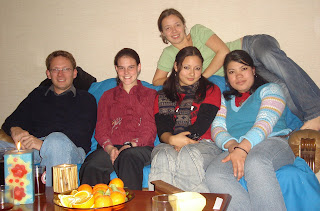
A week ago Sunday we hosted our second 'Africa Worship! Night' at NIC. It was a great night of drums, dancing and praising God in a traditionally African way. Groups from the Cameroon, Nigeria, Ghana, and Zimbabwe led a multi-cultural, interdenominational congregation that filled the Anglican Cathedral.
Contrast that with our leadership retreat, which we held two days ago at an Anglican retreat center in the foothills of the Troodos mountain range. The day was led by an Anglican spiritual director who guided 16 NIC leaders through periods of silence, meditation, and Scripture reading. We finished the day with communion and a fellowship dinner.
While NIC leadership was responsible for both events, they couldn't have been more different. One was loud, the other quiet. One was big, the other small. And yet God spoke in both. The diversity has been a great way for us to grow spiritually, and it is one of the things I love about this church. It isn't an easy church to be a part of precisely because worshiping with such diversity requires work, but I think it's important.
In some sense, NIC is a revelation of the mystery Paul wrote of in Ephesians 3:6 -
This mystery is that through the gospel the Gentiles are heirs together with Israel, members together of one body, and sharers together in the promise in Christ Jesus.This type of unity in diversity is also a powerful witness to the world and an answer to Jesus' prayer found in John 17:23 -
May they be brought to complete unity to let the world know that you sent me and have loved them even as you have loved me.Unfortunately, I don't have pictures of the Africa Worship! Night, but I do have one from the leadership retreat. The countries represented were Zimbabwe, Sri Lanka, England, Ghana, Lebanon, the Cameroon, United States, Cyprus, Latvia, and Nigeria.
 Christmas dinner
Christmas dinner




 A week ago Sunday we hosted our second 'Africa Worship! Night' at NIC. It was a great night of drums, dancing and praising God in a traditionally African way. Groups from the Cameroon, Nigeria, Ghana, and Zimbabwe led a multi-cultural, interdenominational congregation that filled the Anglican Cathedral.
A week ago Sunday we hosted our second 'Africa Worship! Night' at NIC. It was a great night of drums, dancing and praising God in a traditionally African way. Groups from the Cameroon, Nigeria, Ghana, and Zimbabwe led a multi-cultural, interdenominational congregation that filled the Anglican Cathedral.



